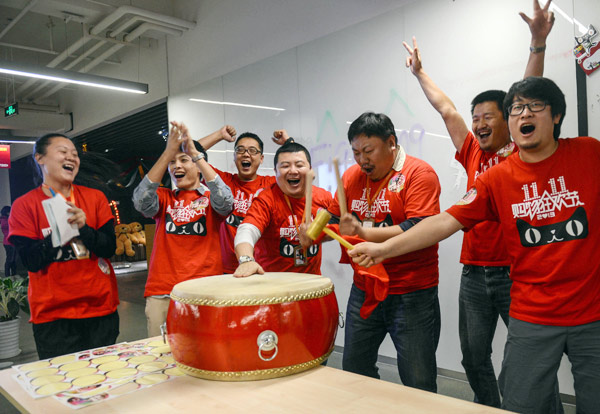 Most amazing chi-pao beauties
Most amazing chi-pao beauties
 Beauties forever
Beauties forever
 Picturesque autumn scenery of Hongshan Army Horse Ranch
Picturesque autumn scenery of Hongshan Army Horse Ranch
 Lingerie show at 2014 Miss China
Lingerie show at 2014 Miss China
 Swans begin to migrate from Xinjiang
Swans begin to migrate from Xinjiang
 30 romantic and beautiful sceneries around world
30 romantic and beautiful sceneries around world
 Beautiful autumn leaves around the world
Beautiful autumn leaves around the world
 Fantastic tour to Tibet
Fantastic tour to Tibet
 Opps! What a coincidence!
Opps! What a coincidence!
 Breathtaking scenery in Redstone Park in SW China
Breathtaking scenery in Redstone Park in SW China
 |
| Alibaba’s Tmall sales team celebrates its “bumper harvest” of completed transactions on Nov 11 last year. The ecommerce giant expects even better results this year. HAN CHUANHAO / XINHUA |
E-commerce giant to use the November day of shopping to grow global presence
China's e-commerce conglomerate Alibaba Group Holding Ltd aims to expand its reach across borders by upgrading its upcoming Nov 11 shopping festival into a global online shopping carnival.
"Globalization" is one of Alibaba's main strategies for this year's double 11 online shopping festival, which falls on Nov 11 every year. The online shopping festival last year was China's largest and ended with two of Alibaba's marketplaces Taobao and Tmall ringing up 35 billion yuan ($5.75 billion) in sales over the 24-hour period.
Wang Yulei, president of Alibaba's business-to-customer site Tmall, said that this year's Nov 11 shopping festival is going to be the group's first shopping event that covers shoppers on a global scale.
According to him, Alibaba has made efforts to help more Chinese suppliers sell to overseas buyers and enable more Chinese shoppers to purchase goods from abroad during the shopping event.
He said that Alibaba has for the first time set up servers overseas, which is expected to enable a rapid and smooth cross-border shopping experience on the day with a large number of people visiting the Tmall site.
What is more, the e-commerce group has also set up warehouses overseas and strengthened cooperation with overseas logistics firms and customs authorities. "More than 200 overseas merchants from more than 20 countries have confirmed participation in this year's ‘double 11' event," Wang said.
It is too early to tell whether the sales volume of Alibaba on Nov 11 will go up this year due to its global strategy. Wang from Tmall refused to reveal the sales target, only saying that sales at this year's event will no doubt exceed last year's.
Insiders and analysts have different opinions on sales projections for the 24-hour online event ranging between 40 billion yuan to 100 billion yuan.
Neil Flynn, head equity analyst at Shanghai-based Chineseinvestors.com, a leading financial analysis firm of US-listed Chinese companies, said Alibaba's sales last year of 35 billion yuan was a 83 percent increase from the level recorded in 2012. "I would be looking for a minimum of 50 billion yuan in sales for this year's Nov 11 festival," he said.
Wang Xiaoxing, an analyst with the Beijing-based Internet consultancy Analysys International, said there would be a significant growth in this year's sales, but the growth rate is likely to be less than last year's 83 percent. "The projection is in line with the slowing growth momentum of the overall online shopping market in China," he said.
Both Flynn and Wang said it makes a lot of sense and it is certainly feasible for Alibaba to make this year's Nov 11 shopping festival a global event especially after its sensational IPO on the New York Stock Exchange in September.
"As Alibaba's chairman Jack Ma wants the group to hit the long-run target of 100 billion yuan in sales, they can't rely on Chinese consumers spending more and more each year on the same products. They need to expand their product range, which will increase the average purchase value in China, and they need to expand their customer base," said Flynn.
"This (global Nov 11 shopping festival) also provides a great way for Alibaba to establish themselves on a global scale. It remains a China focused firm, but if it offers significant discounts to consumers abroad, then they can expand their reach across borders," he said.
Wang from Analysys International said that Alibaba may be a familiar name for Western shoppers after the group's IPO, but there is still a long way to go for the group to compete in matured Western markets with strong local competitors.
"The deliveries in cross-border online shopping usually take a long time, and Alibaba will have to grapple with the challenge of ensuring high-quality after-sales services to Western shoppers," he said.
Flynn also has doubts as to whether Alibaba can compete with its American counterparts at this moment. "Tmall and Amazon provide very similar services, and Western customers have been using Amazon for years," he said.
 Standard faces for each countries
Standard faces for each countries Who is China's campus beauty queen?
Who is China's campus beauty queen? Netizens fall in love with champion swimmer Ning Zetao
Netizens fall in love with champion swimmer Ning Zetao Vibrant 21-year-old and her own Cheongsam brand
Vibrant 21-year-old and her own Cheongsam brand Fashion style: Faye Wong vs Cecilia Cheung
Fashion style: Faye Wong vs Cecilia Cheung Jungle law: leopard preys on impala
Jungle law: leopard preys on impala Female bus driver drives Land Rover for commuting
Female bus driver drives Land Rover for commuting Leading director Wang Quan'an detained for 'buying sex'
Leading director Wang Quan'an detained for 'buying sex' Amazing aerial photos of China's Xisha Islands
Amazing aerial photos of China's Xisha Islands Top 10 handsome football players
Top 10 handsome football players  Top 10 Chinese goddesses
Top 10 Chinese goddesses  Top 20 hottest women in the world in 2014
Top 20 hottest women in the world in 2014 Top 10 fifth generation jet fighters in the world
Top 10 fifth generation jet fighters in the world Top 10 pure beauties in showbiz
Top 10 pure beauties in showbiz  Top 10 world's highest-paid models 2014
Top 10 world's highest-paid models 2014 The most gorgeous Chinese women
The most gorgeous Chinese women Top 10 most handsome faces in Asia
Top 10 most handsome faces in AsiaDay|Week|Month